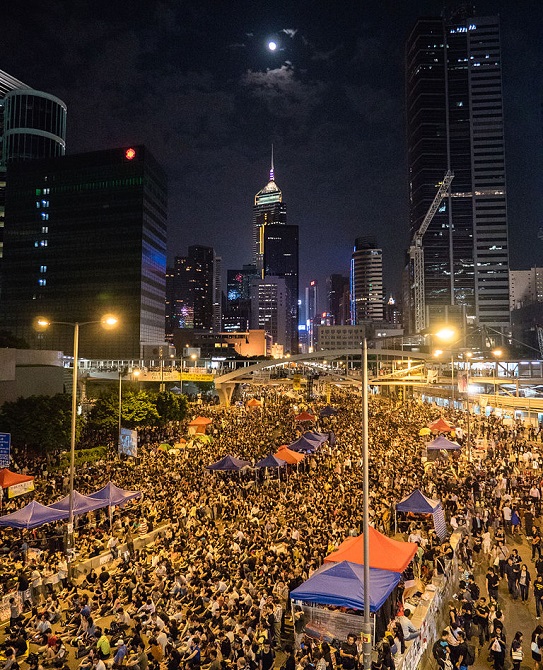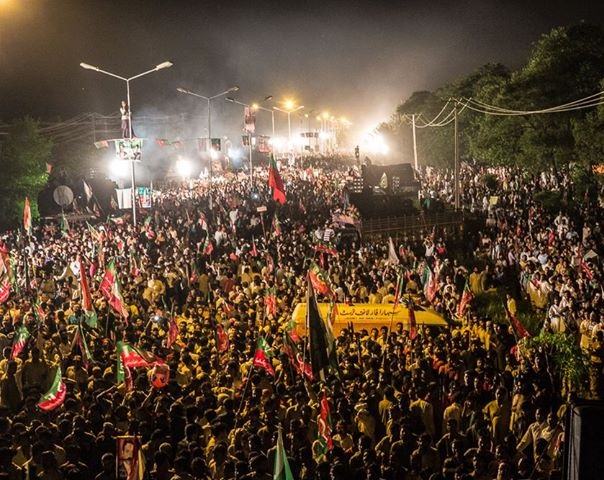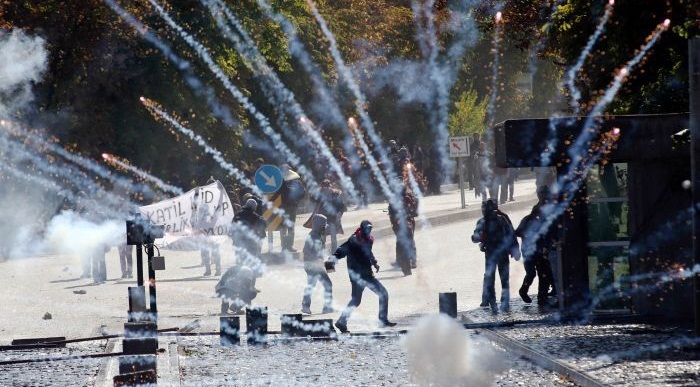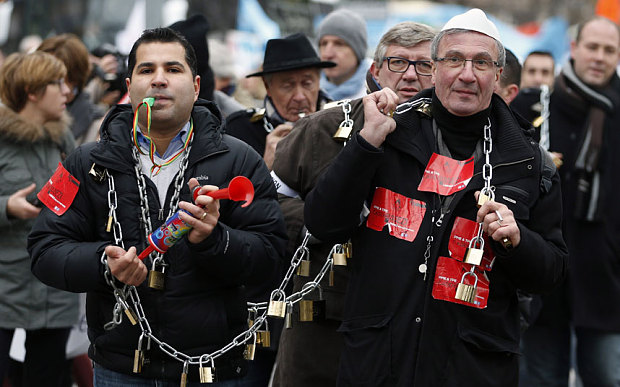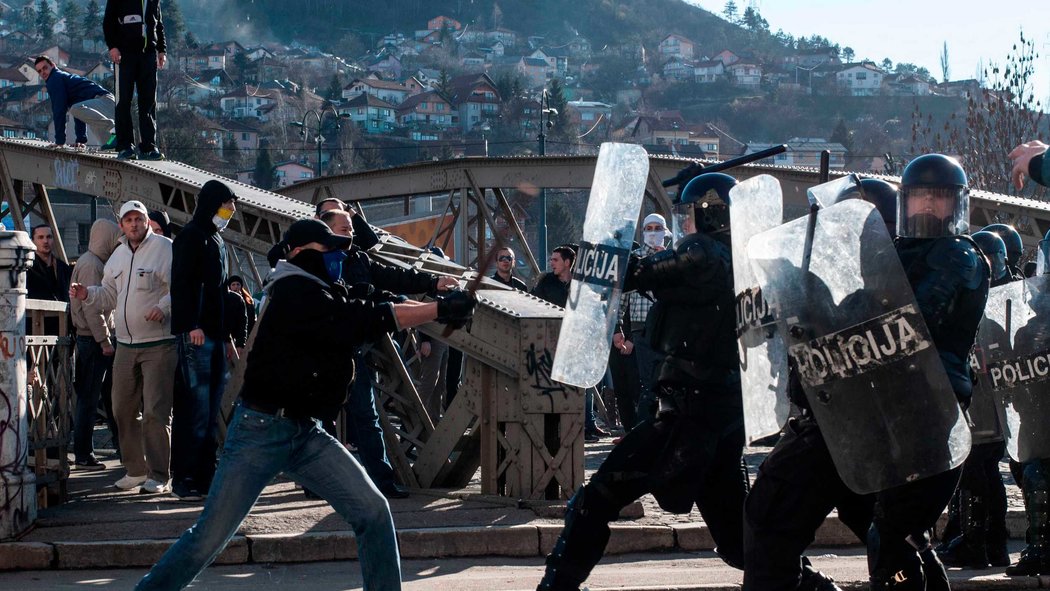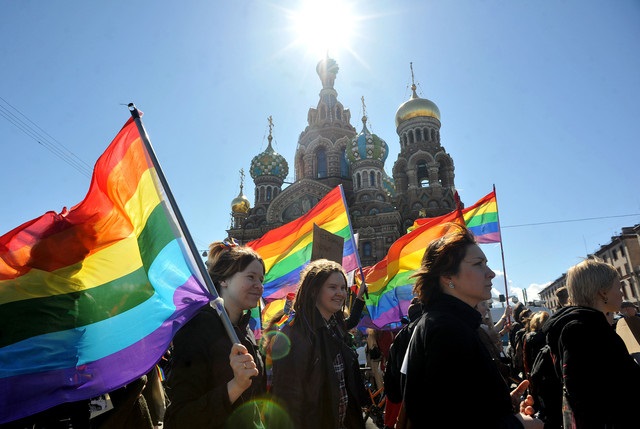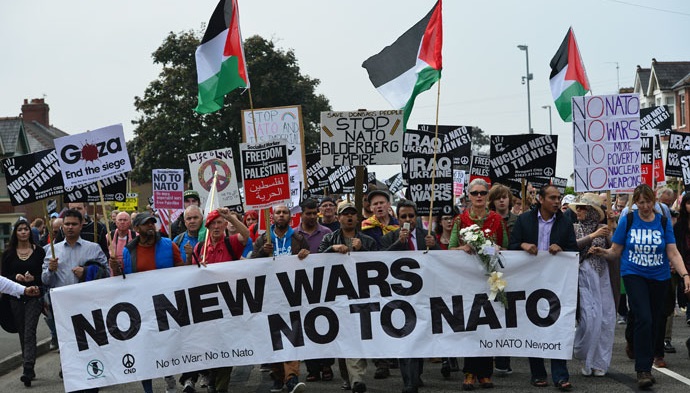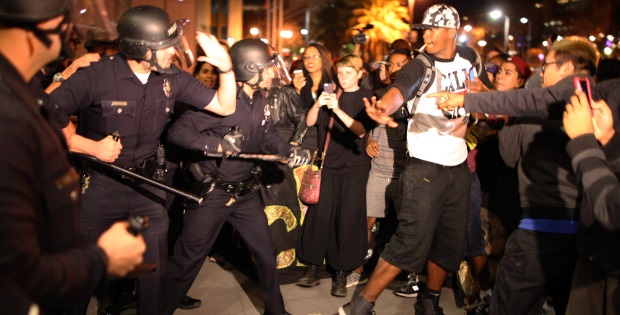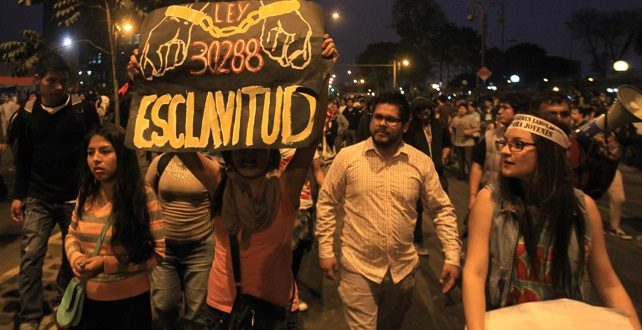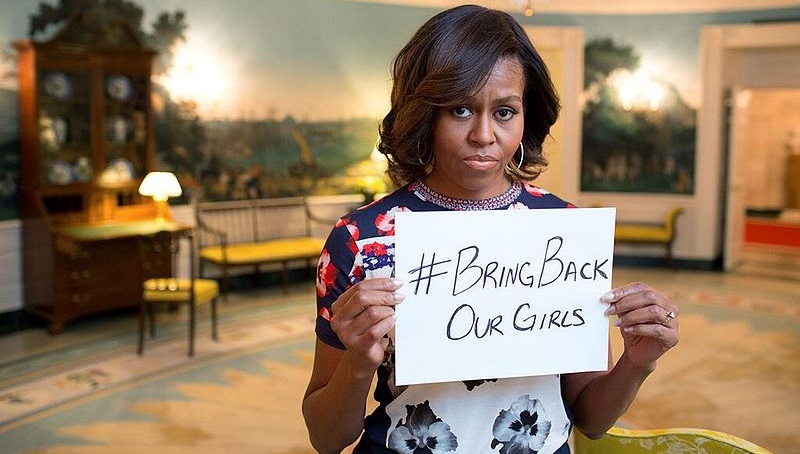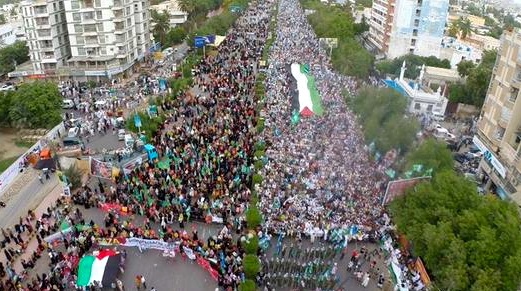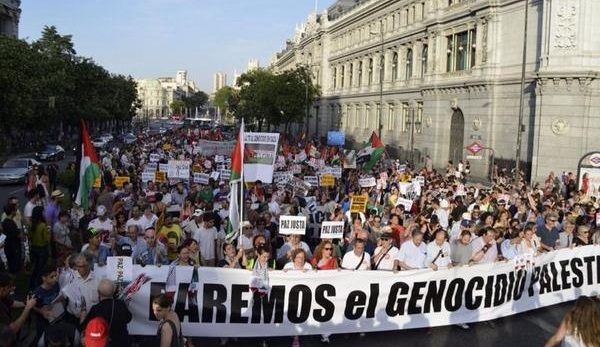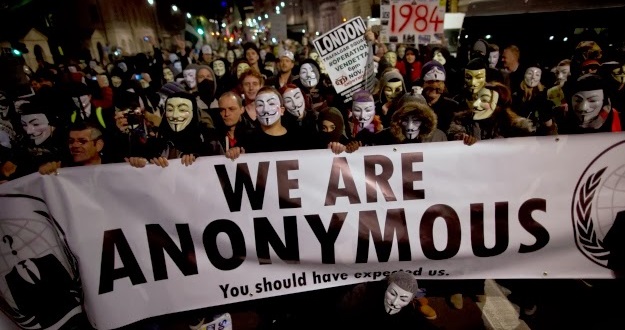2014 – Remembered as Year of Powerful Protests
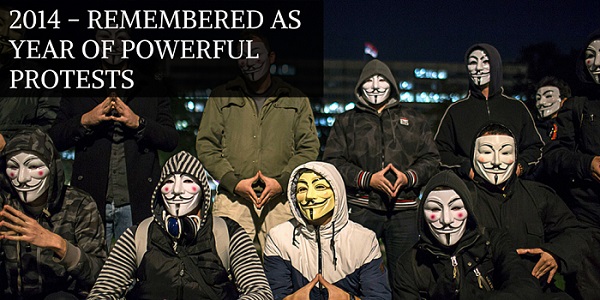
People from Europe to Asia, from Africa to the Americas, flooded the streets to make their demands heard and bring a change in their lives, making 2014 a year of extraordinary protests. Some of the slogans used by the protestors were supported by global community including Bring Back our Girls, Black Lives Matter, Israeli attack on Gaza, EuroMaidan and Umbrella Movement.
From peaceful sit-ins to tear-gassed streets, from silent opposition to bloody revolts, the year 2014 witnessed it all as people protested against corruption, erroneous government policies, rising inflation, high crime rates, inequality, strict laws, austerity reforms, government and police violence, election rigging and wars.
Human rights, security, employment, basic education, justice, state transparency and accountability, were the general demands that forced the protestors to take to the streets. Few protests succeeded in overthrowing political leaders, others retreated gradually with time but generally the protestors could not achieve their major goals as political, social and economical landscapes of those states remained same at the beginning of 2015.
The demonstrations, however, symbolize the courage and power of the ordinary people who are now standing up for their rights to make an attempt to change their lives rather than merely hoping and looking up to the government. An icon that connected the disparate worldwide demonstrations was the Guy Fawkes mask that gained popularity after the ‘V for Vendetta’ movie. The mask emerged as a powerful symbol of rebellion, resistance and change at powerful protests held in different parts of the world this year.
Australia – Protest during G20 Summit
Hundreds of protesters stages peaceful protests for a variety of causes in Brisbane, hoping to highlight their causes in front of world leaders including US President Barack Obama and British Prime Minister David Cameron, who gathered for the G20 summit.
Economic issues, Climate change, Ebola crisis, conflict in Ukraine, were some of the issues raised by the protestors in hopes that the gathering of world leaders gathered in Brisbane for the annual G20 Summit, would take up these issues in the conference. The protesters included members of the Aboriginal communities, political groups, environmental activists as well medical workers.
Taiwan - Sunflower Movement
Over 100,000 protesters, many holding up sunflowers, congregated on the Taiwanese capital of Taipei in March, protesting against the Cross-Strait Service Trade Agreement (CSSTA) and accusing their government of secretly pushing through a controversial trade deal with China.
In late March 2014, protesters occupied Executive Yuan building, the seat of Taiwan’s parliament, for three weeks before Taiwan's government agreed to greater scrutiny of its dealings with China. Taiwan’s government asserted that the agreement would boost its faltering economy, but students thought it would result in Taiwan becoming too dependent on China.
The movement became known as the “Sunflower Movement” which symbolizes the light that the protesters wanted to shine on Taiwan's relationship with China, as well as the demand for greater government transparency. On March 30th, students organized a demonstration that saw more than 500,000 Taiwanese citizens supporting their cause. The government could not withstand the pressure. Legislative Speaker Wang Jin-Pyng accepted the demands of the protestors.
The Sunflower Movement, officially concluded on April 10th, became one of the biggest political movements in the past 30 years of Taiwan history which stimulated younger generation’s awareness about politics, democracy and the identity of their country.
Cambodia – Protests against government
The 2014 demonstrations in Cambodia were part of protest ongoing from July 2013 against the government of Prime Minister Hun Sen. The protests prominently held in the capital city, Phnom Penh, were triggered by widespread allegations of electoral scam during the Cambodian general election of 2013. Resentment at Vietnamese influence in Cambodia and demands to raise the minimum wage to $160 a month were also part of reasons of the protests.
Thailand: Anti-government protests
Anti-government protests took place in Thailand between November 2013 and May 2014, organised by the People's Democratic Reform Committee (PDRC) demanding expulsion of Prime Minister Yingluck Shinawatra alleged to be a puppet of her billionaire brother, the exiled Prime Minister Thaksin Shinawatra. Protesters view Thaksin as corrupt and damaging to Thailand's democracy, although he enjoyed strong support in many areas of Thailand.
The protests were first triggered by a proposed blanket amnesty bill that would have pardoned several politicians and military leaders from various charges since 2004. But other issues such as the royal succession, social inequality, centralized bureaucracy, royal and military influence in politics were also seen as factors behind the crisis. The major demand was to replace Yingluck’s government with a non-elected “people's council” to clear out corruption.
On 7 May 2014, Yingluck and 9 ministers were removed from office by the Constitutional Court. Following months of protests and political crisis, the Royal Thai Armed Forces launched a bloodless coup d'état against the caretaker government of Thailand on 22 May 2014. Some Thai protesters against the coup used the three-finger salute, representing equality, liberty and brotherhood. The gesture from the Hunger Games film series and protests was later banned by Thailand's ruling junta.
India - Protests against Gang Rape
In May 2014, hundreds of protesters demanded government to put an end to violence against women after two Indian village girls aged 14 and 16 were gang-raped and hanged. The girls left home to visit nearby field, which they used as a toilet, but never returned and by the next morning they were found hanging from a tree in the village after being raped. India police fired water cannons to disperse hundreds of protesters in Uttar Pradesh state who were driven by a sense of powerlessness and anger due to increasing rape cases.
In the first week of December 2014, another rape case sparked protests on the streets and online, leading to debates all over India for tougher laws to protect women in India. The driver of mobile taxi-booking service Uber was detained on charges of raping a female passenger.
India protest against forced conversions
Protests erupted in Indian parliament and in the streets over a campaign by Hindu hardliners to forcibly convert Muslims and Christians to Hinduism. A group of Muslims complained they had been tricked into attending a conversion ceremony by Hindu groups in December which fueled a sensitive debate that stalled parliament and threatened Prime Minister Narendra Modi’s economic reform agenda
Indian Prime Minister Narendra Modi is facing the strong criticism for not doing enough to stop hard-liners in his party from forcibly converting religious minorities to Hinduism, which threaten India's secular foundations.
China: Pro-democracy demonstrations in Hong Kong
Demonstrations began outside the Hong Kong Government headquarters from 22 September 2014 demanding genuine universal suffrage, resignation of Chief Executive CY Leung and abolishment of functional constituencies of Legislative Council of Hong Kong.
Occupy Central movement was first started by Benny Tai, a professor at the University of Hong Kong, and his two friends in 2013 to put pressure on the Hong Kong and Central government in Beijing for genuine universal suffrage of Honkongers through dialogue, deliberation, civil referendum and civil disobedience. The protests, started by students, drew up to 100,000 people, and also gathered some international support.
The Occupy Central campaign is also known as the Umbrella Movement where umbrellas were referred as a symbol of defiance and resistance against the Hong Kong government.
The movement started to lose its momentum as the co-founders of Hong Kong protest surrendered urging students to retreat. After 79 days, Occupy Central protests for democracy that swarmed Hong Kong started disappearing as protestors leave the area and police began clearing what was called the biggest political protest in China since Tiananmen Square in 1989. But students claim: “This is just the beginning, it’s not the end.”
About 1,000 people were arrested in Occupy Central’s 11 weeks that failed to achieve Hong Kong’s demand of democratic reforms and Chief Executive CY Leung also dismissed demands for his resignation.
Pakistan - Anti-government protests in Pakistan
Revolution March by PAT supporters
Inqilab March (Revolution March) was a massive public protest by the Pakistan Awami Tehrik (PAT) party that occurred from August to October 2014 in Islamabad. Islamic Scholar and chief of PAT, Muhammad Tahir-ul-Qadri, led thousands of people in hundreds of cars, buses and trucks towards Islamabad. Pakistan’s worsening health, security and education situation along with rising inflation, unemployment, energy crises, corruption were some of the key issues raised by the cleric that attracted the masses. The protests were triggered after a violent clash in Lahore between the Punjab Police and Pakistan Awami Tehreek activists in June 2014 resulting in deaths of several protestors. The protestors demanded removal of Prime Minister Nawaz Sharif's current government, and the introduction of social welfare reforms as well as social, political and economic justice. The protest has temporarily ended.
Freedom March by Imran Khan
Azadi March (Freedom March) is one the largest public protest ever held in Pakistan that coincided with Pakistan's Independence Day on 14 August 2014. Imran Khan, the leader of opposition party Pakistan Tehreek-e-Insaf Party (PTI), launched countrywide sit-in protests demanding the expulsion of Prime Minister Nawaz Sharif over allegations of massive rigging in 2013 general elections. Thousands took part in protest held in Islamabad against the government that continues for 126 days chanting the slogan “Go Nawaz Go”.
The protest generally remained peaceful with few reports of clashes between few hundred protestors and police in riot gear when Islamabad's normally pristine Constitution Avenue was filled with tear gas canisters. The major demands of the protest included abolition of the Sharif government, replaced with a caretaker government, resignation of Prime Minister Nawaz Sharif and his brother, Punjab chief minister and transparent investigation of 2013 electoral fraud. Khan also extended one-day protests to several cities including Karachi, Lahore, Mianwali, Gujrat, Larkana and Multan to pressurize government.
The protest march that began on 14 August 2014 ended on 17 December 2014 when Khan declared an end to four-month long protests in the wake of a deadly a terrorist attack that killed 141 people.
Peshawar Attack Solidarity Protests
Protest and vigils were held in Karachi, Lahore, Islamabad and other major cities after a deadly attack by Taliban on Army Public School in Peshawar, Pakistan, killing at least 148 people, 132 of them children, and injuring scores of students. The global community also expressed anger and grief over the brutal attack at numerous vigils across the world in Canada, USA, UK, Turkey, Australia, Norway, Tanzania, Sri Lanka, Iran and United Arab Emirates.
Bahrain uprisings 2014
Tens of thousands of Bahrainis joined a peaceful demonstration to mark the third anniversary of a pro-democracy uprising led by majority Shi'ite Muslims of Bahrain. The rally organized by the main opposition al-Wefaq movement was one of the biggest since 2011. Many, but not all of the protesters, were Shia Muslims, who make up country's unhappy majority who complain of discrimination, high unemployment and inadequate housing. The Bahraini authorities, along with their Saudi backers, view Shi'ite demands for political reform as Iranian-inspired subversion.
Bahrain’s parliament has passed strict new laws to curb opposition activists, including banning protests and brutal crackdown by police on peaceful and unarmed protesters. Courts have also jailed prominent opposition figures and others. Recently protests were held against the detention of the head of the banned Al-Wefaq movement marked by clashes with security forces. "The Bahraini Authority is moving backward to a police state instead of taking steps toward a political solution and an end to the serious human rights violations against citizens,” opposition groups claim.
Bahrain’s march toward freedom and democracy began decades ago, but major protests broke out in the Bahraini capital of Manama on 14 February 2011. The problems began when the country was caught up in the Arab Spring, a revolutionary wave of demonstrations and civil wars in the Arab world, at the start of 2011.
Bahrain, a small kingdom is regarded as a strategic Gulf state, and it hosts the home base of the US Navy's Fifth Fleet.
Jordan in support of resistance against Israel attack on Gaza
Jordanian supporters of the Muslim Brotherhood gathered the capital Amman in August 2014 in support of the resistance and celebrated what they called Hamas' victory against Israel during the last assault on the Gaza Strip. Demonstrators waved Palestinian and Jordanian flags as well as the Islamist Palestinian rulers of Hamas, who have been locked in a month-long deadly showdown with Israel.
Organizers say around half a million people attended the rally while security officials put the number at more than 100,000. Hundreds of people also marched to the Jordanian prime minister's office on Friday in a demonstration organised by leftist parties and trade unions to denounce the Israeli offensive on Gaza.
Turkey Protests
Protest over the closure of Syria-Turkey border to stop the flow of refugees
Turkey's Kurds reacted with anger, with protesters battling riot police in cities including Istanbul and Ankara, over Turkish government refusal to help lift the Islamic State siege of the Syrian border town of Kobane. At least 25 people died in Turkey protests after government refused to send their tanks to Kobane to establish a safe corridor to ferry fighters and supplies to the besieged Kurdish fighters.
Kurdish forces say they have stalled the advance of Islamic State (IS) militants in the town after American airstrikes but the activists are demanding more help for the besieged Kurdish forces struggling to hold onto the Syrian town of Kobane.
Protests after the death of a teenage boy who in anti-government protests
The death of 15-year-old Berkin Elvan - a Turkish teenager who got caught up in street battles in Istanbul between police and protesters in June 2013 and died after being hit by a tear-gas canister during 2013 Gezi protests. The boy's death after nine months in a coma ignited fresh anti-government sentiments leading to demonstrations, with tens of thousands of people taking to the streets of Istanbul and other cities. Riot police later had to intervene with water cannon, tear gas and rubber pellets to propel protesters. While Elvan's death sparked the protests movement, but demonstrators had a list of complaints ranging from corruption, authoritarian rule, a massive crackdown on dissent to a lack of accountability for the authorities.
Israel: Protest against new conscription laws
Hundreds of thousands of ultra-Orthodox Jews, wearing black hats and coats, the traditional Haredi garb, protested in Jerusalem against a law that would require them to serve in the military and end a generations-long tradition of military exemption for the most religious Israelis. The protests choked streets in Jerusalem with teeming masses who claimed the law it violates their religious right to study the Holy Scriptures, a foundation of Jewish life. But some Israelis say the Haredi, a rapidly growing demographic that represents 10% of the country’s population, need to share the burden of military service.
Egypt experienced wave of Protests throughout 2014
The third anniversary of the Egyptian uprising in January was a day of protest and mourning. Supporters of Egypt's ousted President, Mohamed Morsi, as well as activists opposed to despotism of both Morsi and army chief Abdel Fatah al-Sisi, took part in protests in which 49 people died and 1079 people were arrested.
In late November, a movement called “Muslim Youth Intifada” took to the streets of the Egyptian capital to topple military rule in Egypt. The Muslim Brotherhood also lent its support to the demonstrations in which scored of people were injured and four killed.
Hundreds of demonstrators gathered at Cairo University after court dropped its case against Hosni Mubarak, the president who was removed from power in the 2011 uprising that ended his 30-year rule.
International criticism on ruling of Mass death sentences
In 2014 Egypt also drew international criticism for its controversial verdict of mass death sentences. Egyptian judges meted out preliminary death sentences to over a thousand supporters of ousted President Morsi and Muslim Brotherhood group in six different trials. Although there is an appeals process but right activist believe it is neither reassuring nor sufficient because the system is fundamentally corrupt.
Kenya - Protests against tuition fee hikes
University students of Kenya demonstrated in at least four cities across the country over a proposed increase in university fees. The protestors in the Kenyan capital of Nairobi had a clash with riot police clash when students threw rocks and debris at police, who returned fire with tear gas and crude hand-carved wooden batons. Kenyan authorities moved against protesters, who were marching on a highway near Nairobi University, in order to retreat them back to the campus.
The protest got violent as riot police fired dozens of rounds of tear gas around and outside the university buildings, witnesses said. There were reports of beating innocent staff and students inside the buildings who tried to escape but were beaten by police and forced back inside.
Burkina Faso - Protests against government and army takeover
Violent protests and riots hit the capital of Burkina Faso in October 2014 when demonstrators expressed their anger over a proposal to extend President Blaise Compaore's 27-year rule. October 30 marked the culmination of several days of demonstrations when protestors stormed the parliament building and set buildings, documents, equipment, and vehicles on fire. Security forces attempted to control the crowds using tear gas and live rounds. Reports said at least three protesters were shot dead and several others wounded.
The demonstrations and riots in multiple cities forced Compaoré to dissolve the government, scrap the planned presidential term extension, and he declared a state of emergency before eventually fleeing to Ivory Coast. Compaore's resignation was followed by army takeover in Burkina Faso which prompted protests in the capital and international condemnation. However by mid-November, a civilian, Michel Kafando, was chosen to replace army as transitional head of state who was appointed Zida as the new Prime Minister on 19 November 2014.
Spain: Anti-austerity - Anti-corruption - Anti-globalization Protests
Thousands of people demonstrated against the Spanish monarchy, demanding the return of a democratically elected head of state and to abolish Spain's monarchy.
The demonstrators also protested in different Spanish cities and focused on several law reforms that they regard as affronts to their rights as Spanish citizens. They include new legislation that would radically restrict the right to protest and an amendment to abortion law that would allow the procedure only in case of rape or serious risk to mother’s health.
Thousands of people also gathered in the center of Barcelona in an event the organizers dubbed “Disobedience 2014” in protest of government austerity measures. The protesters marched under a large banner saying: “Disobedience 2014. They can’t control us if we disobey. Let’s stop [Justice Minister Alberto Ruiz-Gallardon’s] laws!”
Around 20,000 to 50,000 demonstrators also gathered in Barcelona to protest EU leaders' plans to liberalize energy and financial markets. A Campaign Against a Europe of Capitalism and War was organized by the umbrella organization of protest groups.
France – Protest against the government's austerity reforms
French lawyers, notaries and bailiffs took to streets in Paris against new reforms after unemployment has risen above 10% in France. Thousands of company owners also demonstrated in several French cities including Paris and Toulouse, in a rare protest against the red tape and high taxes they claim are killing off their companies, choking the economy and the spirit of free enterprise.
After the protests, President François Hollande announced that government is ready to ease rigid labor rules and grant tax breaks to companies to stimulate an economy that has suffered stagnant growth and high unemployment for the last two years. French Prime Minister Manuel Valls also announced reforms aimed at boosting the economy and combating unemployment.
Meanwhile death of an environmental activist, killed by a police stun grenade in October, sparked a wave of protests in Southern France as large numbers of demonstrations were held in November from Paris to smaller towns.
Belgium – Protest against government's budget policies
The austerity policies of Belgium’s new right-wing government have led to the biggest trade union demonstration in the country since 1986. The trade unions object to government policies that promise to raise the pension age from 65 to 67, freeze the automatic link between wages and inflation, and cut public services that would affect the entire population. The government however says it has been forced to push through strict measures to keep the budget deficit within European Union constraints.
The spirited and peaceful demonstration of 120,000 Belgians comprising of unionists, students, feminists and independent leftists, was one of the largest mobilisation in Belgium in 30 years. Some violent clashes were also reported with 50 injured and 30 arrested.
A nationwide strike in Belgium on 15 December, against the government's budget plan, brought air, rail and road transport to a halt and affected schools, businesses and offices across the country.
Germany - Anti-Immigrant Rally
In December 2014, Germany saw one of the largest and fast growing anti-immigration protests that has drawn support from the far-right as well as ordinary citizens alarmed by a sharp rise in refugees, many fleeing conflict in the Middle East. Thousands of supporters of the right-wing extremist movement called PEGIDA, or Patriotic Europeans Against the Islamisation of the West, gathered at a demonstration in Dresden against anti-immigrant chauvinism and racism.
The demonstrations, sweeping all across Germany, reflect discontent of the Germans with country’s policy of encouraging immigration and sheltering refugees as reports say about 200,000 refugees arrived in Germany in 2014 mostly from war zones in Syria and Iraq. Rise of anti-foreigner sentiment in Germany is a concern for many but the organizers insist they are protesting only against extremism and not against immigrants or Islam itself.
Chancellor Angela Merkel condemned all forms of chauvinism and stressed that Germany needs immigrants to help it cope with a looming demographic crisis resulting from one of the lowest birth rates in Europe. A political scientist at Cologne University, Thomas Jaeger, believes the protests are extremely dangerous for Merkel as a political movement is now opening up to the right of her conservative party which had never happened before.
Hungary - Public outrage day
More than 10,000 Hungarians gathered outside the parliament in Budapest on 17 November 2014 to protest against alleged corruption and the centralization of power in a protest dubbed “public outrage day”. Demonstrators chanted slogans against Prime Minister Viktor Orban, calling him to resign, and to expel six public officials. The crowds mostly comprised of young, educated and middle class people who were joined by opposition politicians.
In late October 2014, Hungarians staged anti-government demonstrations which were triggered by the announcement of tax on internet usage to be in effect from 2015. But after thousands rallied, Mr Orban surprisingly dropped the tax plans.
Bosnia and Herzegovina riots and protests
The 2014 turmoil in Bosnia and Herzegovina is a series of demonstrations and riots that began in the northern town of Tuzla on 4 February 2014, but quickly spread to multiple cities in Bosnia and Herzegovina, including Sarajevo, Zenica, Mostar, Jajce.
The country witnessed worst violence since the end of the war in 1995 when government buildings were set alight in Sarajevo, Zenica and Tuzla in February Most of the riots calmed down by 8 February but peaceful protests have continued all over the country since then. “We have been lied to for 20 years. We have been oppressed for 20 years, people are hungry, people are starving. We do not have job prospects here, we will not have a future here unless we change something” activists complained.
On December 24, around 200 workers from bankrupt firms in the Tuzla region also started a protest walk on across the border towards Croatia, aiming to “leave the country” because of their hopeless situation.
Romania – Protest ahead of Presidential run-off vote
The recent protests in Romania are continuation of a wave of civil unrest, mass demonstrations and political disputes that Romania has experienced since 2012. Some 20,000 Romanians gathered in city squares in protest during March to September 2014 in major Romanian cities in support of compatriots living abroad who could not cast their vote in the first round in the presidential elections. Long queues and bureaucratic hurdles prolonged the voting process at Romanian embassies across the world.
Romanians in Cluj, Timișoara, Craiova, Iași, Constanța, Sibiu and Bucharest took to streets to demand fair elections, while hundreds made their voices heard in London, Dublin and Paris. The uproar triggered the foreign minister's resignation and sparked protests in cities across Romania.
Romania's large and growing diaspora of about four million is widely seen as anti-Ponta, and many voiced their anger when long queues and bureaucratic hurdles prevented them from voting in the first round.
Ukraine - Euromaidan protests and Ukrainian revolution
Ukraine saw its bloodiest week in decades when Kiev’s Independence Square and nearby streets turned into a battlefield in February 2014 in which 77 people were killed and hundreds were wounded in clashes between protesters and police where both fired live and rubber ammunition.
Three months of anti-government protests and days of deadly clashes reached its climax in February resulting in Ukrainian revolution in 2014 that eventually toppled Ukraine's Moscow-backed President, Viktor Yanukovych, followed by changes in Ukraine's sociopolitical system, formation of a new interim government, the restoration of the previous constitution.
The term ‘EuroMaidan’ used by protestors soon became popular globally. ‘Euro’ is short for Europe and ‘Maidan’ refers to the Independence Square of Kiev which later became the site of protests and bloody battles with riot police. Maidan carries a historic symbolism as in 2004 it was the focal point of Ukraine's Orange Revolution which had been mired by years of corruption, mismanagement, lack of economic growth, currency devaluation.
EuroMaidan also has a deeper significance for many Ukrainians for whom Europe has become a symbol of genuine democracy in contrast to the corrupt system by Yanukovych. Ukrainian President’s decision to suspend talks with the European Union in favor of closer ties with Russia sparked protest in November 2013. Ukraine’s 45 million people are still at stake with the country's fate now part of a wider strategic battle between the West and Russia.
Russia: Protest performance at Sochi Olympics
During the 2014 Winter Olympics, protests and campaigns arose surrounding the rights of lesbian, gay, bisexual, and transgender (LGBT) people in Russia. Demonstrators raised rainbow flags - an international symbol for LGBT rights - during a protest over a controversial Russian law banning ‘propaganda of non-traditional’ sexuality.
The gay propaganda law is widely seen as an attack on gay rights. The law makes providing information on homosexuality to under-18s a crime, punishable by a fine. Some athletes attending the upcoming Sochi Olympics in Russia also denounced the legislation.
Anti-war demonstrations in Russia
Massive anti-war protests were held in Russia in March, and recently in September 2014 to oppose the 2014 Russian military intervention in Ukraine. The 15 March anti-war protests, named the March of Peace, have been the largest in Russia, with participation of about 30,000 people, since the 2011–13 Russian protests by the Russian opposition against the alleged electoral fraud committed by United Russia during the 2011 election.
The 21 September protests of Russia were supported by thousands of people around the world as anti-war demonstrations were held on the same day in the US, San Francisco, New York, Washington DC, Los Angeles, Seattle, Houston and Boston.
Wales - Protesters stage anti-NATO march
A week of anti-war protests greeted Barack Obama, David Cameron and 60 other world leaders when they met at the NATO summit in Wales, September 2014.
Events have been taking place before the summit, under the banner of ‘No to Nato’, including a march from Newport to the Celtic Manor as the venue hosted the one of the biggest gathering of world leaders ever seen ion Wales. Several hundred protesters held signs such as “end war now” and “We don't need warfare, we need welfare.” Some campaigners had also set up peace camps in Newport's Tredegar Park before the arrival of protesters ahead of NATO summit.
United States - Nationwide Protests over killing of black teenager, condemning police brutality
The fatal shooting of unarmed black teenager Michael Brown by a white police officer in August sparked weeks of unrest in Ferguson, Missouri. An eyewitness described Brown raising his hands in the air before he was killed. The gesture of surrender, with the slogan "Hands Up, Don't Shoot," became a symbol of the nation's outrage at brutal police tactics and racial inequality. The protests further spread across the U.S. as well as abroad when a grand jury declined in November to indict Ferguson Police Officer Darren Wilson for Brown's killing.
Another event that stirred public protests and rallies happened in December 2014 when a grand jury in New York decided not to indict a white police officer for the death of Eric Garner in a police chokehold. Garner's last words, "I Can't Breathe," became another slogan of the protests, along with "Black Lives Matter."
From California to New York to Los Angeles, there have been widespread protests ainst general police brutality and court ruling as demonstrators expressed disappointment with the decision but few said they were surprised by the ruling as they consider the life of a young black man is considered cheap.
Nationwide demonstrations and die-ins are being continued as protesters raising their hands chanting "Hands Up, Don't Shoot" while other waving signs reading “Black lives matter!” to condemn abusive police tactics in light of the growing number of deaths of unarmed black men police officers. Congressmen, football players and protesters around the world have all expressed solidarity with demonstrators. American football players wearing “I can't breathe” T-shirts with their hands raised in the iconic “hands up” is being hailed as a strong support to the protests.
Mexico - Protests over the disappearance of 43 students
Thousands protested in Mexico to complain about the government's handling of the case of 43 students who went missing in Iguala (Mexico) from a rural teachers' college in September 2014. The students were ambushed by police on their way to a protest and never seen again. The Mexican government said in November that members of a local drug cartel had confessed to killing the students, in collusion with the town's mayor and local police force, and that at least one student's remains had been identified. But some reporters and relatives of the students allege that the Mexican government played a greater role in the disappearances than it has acknowledged.
The missing students immediately became a symbol of the country’s security crisis, which has already produced countless massacres and over 20,000 disappearances, and which protesters blame on a combination of warring criminal groups and widespread corruption and negligence that gives them free rein. The students' abduction and presumed killing have sparked protests across Mexico and around the world, creating a political crisis for President Enrique Peña Nieto. Protesters have painted "43," the number of students who went missing, on walls, on their faces and on protest banners. "We are not everyone, because we are missing 43," one sign reads.
More than 70 people have been arrested in connection with the disappearances, including the mayor of Iguala, Jose Luis Abarca, and his wife, Maria de los Angeles Pineda, who were detained in Mexico City.
Venezuela: Anti-government protests
Fed up with soaring inflation rates and high levels of crime and shortages of basic goods, Venezuelans took to the streets in early 2014 to express their frustration with the government of President Nicolás Maduro. However Maduro and other officials blame the opposition for the country’s security and economic problems.
The campaign was started by the Caracas-based activist group Un Mundo Sin Mordaza (A World Without Censorship), which organized protesters and propagate the image of "SOSVenezuela" around the world in support of the Venezuelan activists.
A series of protests, political demonstrations, and civil uprising led to some 6,369 protests from February to June 2014 all across the country. The demonstrators, mainly students, were later joined by prominent opposition politicians. Majority of protests remained peaceful with frequent clashes which resulted in deaths of at least 43 demonstrators. The protests that began a year after the death of former president Hugo Chávez have resulted in thousands of arrests, between 800 and 5000 injuries, and over 40 deaths for which Venezuelan government was widely criticized.
Brazil: Protest against public spending on World Cup
Anti-World Cup protests held in 12 cities of Brazil have been as worst for Brazil as the government struggles with strikes, crime and public anger. Protestors carrying banners declaring “Na Copa vai ter luta” (The Cup will have protests), appeals for a general strike and claims that the cost of refurbishing the World Cup Maracanã stadium could be spent on infrastructure or education.
The demonstrations of 2014 were generally smaller than those that occurred during the FIFA Confederations Cup in the previous year, but protesters and police clashed in almost every city hosting the games of the World Cup. Brazil had also been hit by a wave of strikes in 2014 as teachers in Rio halted classes for several days to call for better pay and working conditions.
Peru – Protest against youth employment law
The streets of Peru were filled with more than ten thousand people in December 2014 who marched against the new law restricting employment rights for workers aged 18 to 24 years. Protesters and police had minor confrontations at the first march and both sides had expressed the desire for evading any violence in the march. The recent youth employment law passed by President Ollanta Humala has been surrounded by debate and protests since its inception.
Peru: Protest against government's crackdown on illegal gold mining
Several thousand people protested in Peru's eastern Amazon calling for the repeal of new sanctions against illegal gold mining which stated that people operating mines illegally or breaking environmental rules now face up to 10 years in prison.
Miners in Madre de Dios, one of Peru's main gold-mining regions, say the law will put thousands out of work and accuse the government of wanting to hand over mining concessions only to large multinational companies. But the government says the sanctions will encourage miners to get permits and stop polluting the environment as large areas of jungle have been destroyed by illegal mining.
An estimated 50,000 miners do not have a licence to operate in Peru which is one of world’s major gold producers.
Chile – March for Education
During June to August 2014, tens of thousands of students the streets of Chile’s capital, demanding the government to speed up education reform process after President Michelle Bachelet took power on promises of profound changes. Students and teachers in other cities also joined the protest called “National March for Education”.
The largely peaceful protest was however marred at the end by violent clashes when police used water cannons and tear gas in Santiago. Police reports estimate the number of protesting students was around 25,000 in Santiago, while student organizers round the number to 80,000 people. The current protests are a series of ongoing student-led protests across Chile, demanding a new framework for education in the country since 2006.
Worldwide Protests
Nigeria – Protest against kidnapping of 270 school girls by Boko Haram
More than 270 schoolgirls at the Chibok boarding school in northeastern Nigeria were kidnapped by the Islamist militant group Boko Haram on the night of April 14, 2014.
A group of campaigners in Nigeria started the #BringBackOurGirls Twitter campaign which went viral across the world, prompting messages from public figures notably from Michelle Obama and Malala Yousafzai. The news of abduction of girls sparked global anger and a major campaign calling for their rescue. About 219 Chibok school girls are still being held captive by the Boko Haram.
The global campaign is losing momentum towards the end of the year but relatives and supporters of the kidnapped girls in Nigeria are protesting in the capital city of Abuja with the same demand: Bring back our girls.
Protest against Israeli military action on West Bank
Israel launched a military operation in early July 2014 called Operation Protective Edge in the Hamas-ruled Gaza Strip. Seven weeks of Israeli bombardment, Palestinian rocket attacks, and ground fighting killed more than 2,200 people, the vast majority of them Gazans, during the July-August war, mostly civilians, and 73 Israeli soldiers.
By 22 August, around 20,000 tons of explosives had been dropped on Gaza, according to bomb disposal expert in the Palestinian Interior Ministry. An open-ended ceasefire was announced on 26 August after which both sides declared victory. According to Israel and Palestinian president, Hamas was severely destabilized and did not achieve any of its demands. While Hamas claimed Israel was repelled from Gaza.
On July 24 Palestinian leaders in the West Bank called for a "day of anger" which led to a massive demonstration in the occupied West Bank in which several thousand protesters marched from Ramallah towards East Jerusalem, where they were met by Israeli forces. Three Palestinian protesters were killed, about 100 wounded and several arrested in confrontations with Israeli soldiers at the protest.
Worldwide protest against Israeli attack on Gaza
The military operation by Israel beginning in July 2014 in Gaza strip killed more than 2200 people, mostly Gaza civilians and 73 Israeli soldiers. Israel's ground offensive and particularly the deaths of Gazan children provoked people around the globe to protest and demand end to the violence.
Thousands of pro-Palestinian demonstrators took to the streets of Italy, London, Paris, Rome, New York, Karachi and many other cities to call for an immediate end to Israeli military strikes on Gaza.
Million Mask March rallies sweeping the globe
The Million Mask March is a global movement against austerity, mass surveillance and oppression. Protestors donning Guy Fawkes masks to protect their identity took part in demonstrations held in hundreds of cities around the world. The year 2014 may have been the largest Million Mask March so far, with protests in 481 cities. Described as “the largest world protest” by its own website, the Movement is being closely identified with the Occupy protests, Wikileaks, and the Arab Spring.
Organized by Anonymous, the anarchic ‘hacktivist’ network linked with cyber-attacks against governments including the US and Israel, multi-national corporations such as PayPal and Visa, child porn websites, the Church of Scientology, the British National Party and defenders of media copyright.




















